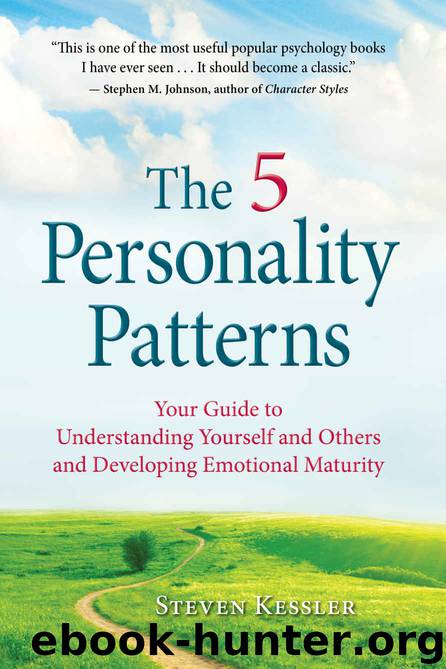The 5 Personality Patterns: Your Guide to Understanding Yourself and Others and Developing Emotional Maturity by Steven Kessler

Author:Steven Kessler [Kessler, Steven]
Language: eng
Format: epub
ISBN: 9780996343909
Google: 1FvhsgEACAAJ
Amazon: B01BSU9U38
Publisher: Bodhi Tree Press
Published: 2015-08-27T22:00:00+00:00
Personality Traits
Now let’s look at the personality traits of the enduring pattern. These are the way an enduring-patterned person will tend to look when he is actually in the pattern. When he is not in pattern, but simply present, these traits may be muted or absent. At those times, he will likely exhibit the gifts of the pattern, such as a solid, strong, grounded presence, unruffled even by the anger of others. But when he is caught in the enduring pattern, his appearance will be more like what follows.
The first thing you’ll notice is that the person looks and feels heavy and stuck. He may even use those words to describe himself. Not much is moving energetically, physically or emotionally. There is a sense of moodiness and misery, but without a lot of drama. There may be some complaining, but little or no action to change the situation.
If you watch closely, you’ll notice that certain things are missing from his behavior. There will be very little direct self-expression, i.e., very few statements such as “I want . . . ,” “I feel . . . ,” or “I decided to . . . .” Statements that reveal a personal feeling, position, or action will be absent. There will be a general avoidance of responsibility for the current situation and an absence of proactive moves to change it.
Even when describing a success or a pleasurable event, he will likely not express pleasure or pride, or even acknowledge his success. This is because doing so creates anxiety in him. Historically, he was punished for expressing pleasure and pride, and he still fears punishment if he expresses — or even feels — such things now.7
You may notice that the strength of his will varies, depending on whether he is initiating motion or stopping it. His will toward initiating action is weak, so he shows poor self-discipline and follow through. But his will to resist action is very strong, so he can endure forever.
When under pressure, he will pull in, hunker down, hide his feelings and desires, resist all movement, and just endure the situation. His general demeanor will be that of someone who is trapped and feels lonely, humiliated, and resentful. However, the resentment will not be overt and blatant, such as we will see later on in the rigid survival pattern. His silent resentment is just the tip of an iceberg of deeply buried rage at how he was treated. It is the visible sign of a secret, spiteful hatred and desire for revenge.
In Character Styles, Stephen M. Johnson has described the secret stance of the enduring pattern very eloquently:
You will never conquer me. I am indomitable. I have fooled you. You think you have suppressed me, but just you wait. You think you have beaten me, but just you wait. I will get even. And you won’t even see it coming. Vengeance will be mine if it takes forever. You will pay for this. My spirit will be avenged. I can wait as long as it takes.
Download
This site does not store any files on its server. We only index and link to content provided by other sites. Please contact the content providers to delete copyright contents if any and email us, we'll remove relevant links or contents immediately.
| Codependency | Conflict Management |
| Dating | Divorce |
| Friendship | Interpersonal Relations |
| Love & Loss | Love & Romance |
| Marriage | Mate Seeking |
The 5 Love Languages: The Secret to Love That Lasts by Gary Chapman(9818)
Doing It: Let's Talk About Sex... by Hannah Witton(9284)
Should I Stay or Should I Go? by Ramani Durvasula(7673)
The Road Less Traveled by M. Scott Peck(7605)
The Lost Art of Listening by Michael P. Nichols(7507)
Daring Greatly by Brene Brown(6518)
Beartown by Fredrik Backman(5761)
We Need to Talk by Celeste Headlee(5617)
Men In Love by Nancy Friday(5246)
The Rules Do Not Apply by Ariel Levy(4972)
The State of Affairs by Esther Perel(4724)
How To Win Friends and Influence People by Dale Carnegie(4515)
Reflections Of A Man by Mr. Amari Soul(4294)
Pillow Thoughts by Courtney Peppernell(4285)
The Ethical Slut by Janet W. Hardy(4260)
Surrounded by Idiots by Thomas Erikson(4087)
Algedonic by r.h. Sin(4065)
He's Just Not That Into You by Greg Behrendt & Liz Tuccillo(3902)
I Love You But I Don't Trust You by Mira Kirshenbaum(3878)
